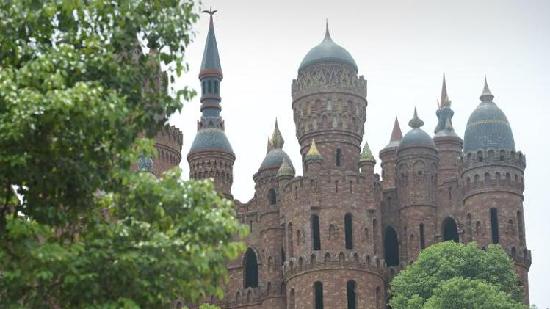当前位置: Language Tips> 双语新闻
China cake millionaire at home in his six castles

|
As the greatest urbanisation drive in history swells China's cities with ranks of identikit apartment blocks, one culinary businessman is indulging his architectural appetite with a visual feast of extravagant, outlandish castles. "I don't have any hobbies, except for planting trees and building castles," said Liu Chonghua, standing on a crenellated turret atop the largest of the six he has constructed. Liu, who made millions from feeding China's growing appetite for cakes and bread, now plans to make his home in the grey stone structure, which resembles Britain's Windsor Castle and towers above the surrounding rice fields. His others include a red-brick fairy-tale edifice stacked with soaring spires, which seems to have emerged from Disney's version of Aladdin, and a white confection with candy-coloured towers reminiscent of Neuschwanstein, the hilltop fantasy built by Bavaria's 19th century 'Mad' King Ludwig II. "When I was a child I heard stories about princes and castles," said Liu, 59, adding that he grew up "with an empty stomach every day" in China's countryside and was sent to dig ditches during the political upheavals of the 1960s. After making his fortune, he said, "I wanted to turn the castles of my dreams into something real." Liu is one of several Chinese millionaires channelling their wealth into eccentric projects, but his designs have led to death threats and put him on a collision course with local officials in the southwestern megacity of Chongqing. His designs were stimulated by buildings in Munich and the chateaux of France's Loire Valley, he said, citing maverick Spanish architect Antoni Gaudi, designer of Barcelona's Sagrada Familia cathedral, as an inspiration. One of his construction workers, former soldier Ma Wenneng, tinkered with a fountain on a balcony and dismissed the challenges of recreating foreign designs on Chinese soil. "Actually, European castles are really easy to build," he said. "The boss has a book of castle pictures in his office and we use that as a reference." China's building boom is unprecedented in human history, with the country's urban population growing by an average of over 20 million people a year for more than a decade -- resulting in hectares of utilitarian, cookie-cutter developments. Urbanisation has raised living standards for millions, but Liu says he is taking a stand against miles of identical apartments. "China needs castles, because it needs a more pluralistic culture," he said. "A city needs people who have dreams, to help society develop." Liu is not the only person chafing at China's homogenous urban environment.The then vice minister of construction Qiu Baoxing complained in 2007 of "a thousand cities having the same appearance". Tom Miller, an expert on China's urbanisation, said: "If you were parachuted in blind to almost any Chinese city, and you were looking around, you would have the same uniform buildings. "When you are building at that kind of enormous speed, you don't worry about aesthetic niceties," he added. But daring new projects from Chinese developers, often employing star international architects, and state-led efforts to renovate historical districts suggest a gradual shift in attitudes. "People are realising that it's not good for everything to look identical, and are realising tourists will pay to see something different," Miller said. Liu says he spent more than 100 million yuan ($16 million), some borrowed from friends, on the buildings, which are free to visit. "I think the castles are very romantic," said a woman surnamed Gao, posing for pictures in a white wedding dress outside a castle beside the headquarters of Liu's firm, which manufactures pastries, biscuits and a product described as a "dreamlike cake." Some local officials feel differently, and two years ago they brought a section of Liu's dream crashing down, sending diggers to knock over a 16 metre high castle gate. "That was my lowest moment," he said. "The government has never appreciated me, they said I've offended local officials," he complained, adding: "I got anonymous calls from someone threatening to run me over with a car." Other newly-minted Chinese magnates have also engaged in bizarre construction projects -- one businessman has built imitations of both the Great Pyramid of Giza and the palace of Versailles on his corporate campus -- but Liu has ambitions for more. "I have achieved half of my dream," he said. "The next part is building better and more awesome castles, the kind that will astound people." Staring wistfully into the distance, he pointed towards a forested mound. "I will build another, bigger castle on top of that hill," he said. |
在中国的发展史中,私人豪华住宅区是城市化发展的一大推动力。如今,有一位烹饪商人正沉迷于一场由奢侈的、异国风情的城堡构成的视觉盛宴。
他建造的另外一些城堡还包括:一座迪士尼版本的“阿拉丁古堡”,它有着童话般红色的墙砖、高耸的塔尖;一座有着缤纷糖果色的塔楼的“蛋糕城堡”,它使人们联想到了19世纪巴伐利亚的“疯子国王”路德维希二世建造的奇幻建筑——天鹅堡。 “我小时候常常听有关王子和城堡的故事。”59岁的刘崇华说道,他在中国农村“每天饿着肚子”长大,而且在六十年代政局动荡之时会被送去挖沟渠。
刘崇华是中国为数不多的几个将财富用于独特爱好上的富翁。但他的设想曾为他招来了他人的恐吓,并且使他与重庆西南几个大城市的当地官员发生了冲突。
“事实上,建造欧式城堡很容易。”他说,“老板有一本有城堡图片的插画书,我们以此作为参考。” 如今中国的建筑热潮在人类历史上前所未有。近十几年来,城市人口以平均每年超过两千万的速度飞速上涨,由此导致了功利主义为导向和千篇一律的发展。
“当人们以如此高速建造房屋时,他们从来不考虑美学问题。”他补充道。
“人们开始意识到,所有建筑同形同状并不是一件好事,也发现了游客们会为新奇不同的东西掏腰包。”米勒说道。 刘崇华说,算上自己支出的和从朋友处借的,他已经在这些建筑上花了超过1亿人民币(约1600万美元)。 刘崇华的公司主要生产糕点、饼干和“梦蛋糕”。而现在,高女士穿着白色婚纱,站在刘崇华公司总部旁的城堡前拍摄婚照。“我觉得这些城堡非常富有浪漫气息。”她说道。 一些当地的政府官员并不这么认为。两年前,他们破坏了刘崇华的部分梦想。他们派挖掘机毁掉了一扇16米高的城堡大门。“那是我人生的最低谷。”刘崇华这样说。 “政府从来都不理解我,他们说我是在与当地官员作对。”他抱怨道,并补充说:“我甚至接到了一则扬言要开车撞我的匿名电话。” 其他一些中国新贵也纷纷参与到独特的建筑项目中来。一位商人在他的公司园区内,模仿胡夫金字塔和凡尔赛宫建造了两栋建筑。但刘崇华的抱负不止于此。
他满怀希望地凝望远方,指着一座树木丛生的山丘说道:“我打算在那里的山顶建造一座更大更壮观的城堡。” (译者 墨宝LCY 编辑 丹妮) |
上一篇 : 美国纪念肯尼迪遇刺50周年 奥巴马赞其影响深远
下一篇 : 你的大脑能“招架”多少朋友?
关注和订阅


电话:8610-84883645
传真:8610-84883500
Email: languagetips@chinadaily.com.cn